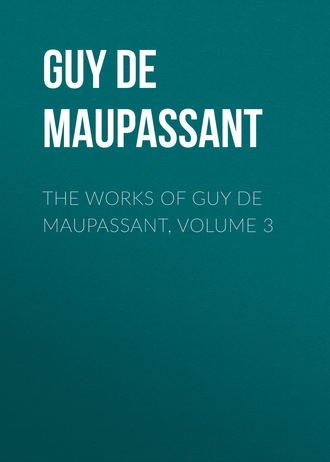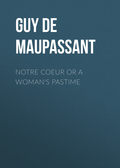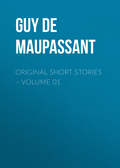
Ги де Мопассан
The Works of Guy de Maupassant, Volume 3
DELILA
In a former reminiscence,6 we made the acquaintance of a lady, who had done the police many services in former years, and whom we called Wanda von Chabert. It is no exaggeration, if we say that she was at the same time the cleverest, the most charming and the most selfish woman whom one could possibly meet. She was certainly not exactly what is called beautiful, for neither her face nor her figure were symmetrical enough for that, but if her head was not beautiful in the style of the antique, neither like the Venus of Milo nor Ludoirsi's Juno, it was, on the other hand, in the highest sense delightful like the ladies whom Wateau and Mignard painted. Everything in her little face, and in its frame of soft brown hair was attractive and seductive, her low, Grecian forehead, her bright, almond shaped eyes, her small nose, and her full, voluptuous lips, her middling height and her small waist with its, perhaps, almost too full bust, and above all her walk, that half indolent, half coquettish swaying of her broad hips, were all maddeningly alluring.
And this woman, who was born for love, was as eager for pleasure and as amorous as few other women have even been, but for that very reason she never ran any danger of allowing her victims to escape her from pity; on the contrary, she soon grew tired of each of her favorites, and her connection with the police was then extremely useful to her, in order to get rid of an inconvenient, or jealous lover.
Before the war between Austria and Italy in 1859, Frau von Chabert was in London, where she lived alone in a small, one-storied house with her servants, and was in constant communication with emigrants from all countries.
She herself was thought to be a Polish refugee, and the luxury by which she was surrounded, and a fondness for sport, and above all for horses, which was remarkable even in England, made people give her the title of Countess. At that period Count T – was one of the most prominent members of the Hungarian propaganda, and Frau von Chabert was commissioned to pay particular attention to all he said and did; but in spite of all the trouble she took, she had not hitherto even succeeded in making his acquaintance. He lived the life of a misanthrope, quite apart from the great social stream of London, and he was not believed to be either gallant, or ardent in love. Fellow-countrymen of his, who had known him formerly, during the Magyar revolution, described him as very cautious, cold and silent, so that if any man possessed a charm against the toils, which she set for him, it was he.
Just then it happened that as Wanda was riding in Hyde Park quite early one morning before there were many people about, her thoroughbred English mare took fright, and threatened to throw the plucky rider, who did not for a moment lose her presence of mind, from the saddle. Before her groom had time to come to her assistance, a man in a Hungarian braided coat rushed from the path, and caught hold of the animal's reins. When the mare had grown quite quiet, he was about to go away with a slight bow, but Frau von Chabert detained him, so that she might thank him, and so had leisure to examine him more closely. He was neither young nor handsome, but was well-made, like all Hungarians are, and had an interesting and very expressive face. He had a sallow complexion, which was set off by a short, black full beard, and he looked as if he were suffering, while he fixed two, great, black fanatical eyes on the beautiful young woman, who was smiling at him so amiably, and it was the strange look in those large eyes which aroused in the soul of the woman who was so excitable, that violent, but passing feeling which she called love. She turned her horse and accompanied the stranger on his side, and he seemed to be even more charmed by her chatter than by her appearance, for his grave face grew more and more animated, and at last he himself became quite friendly and talkative. When he took leave of her, Wanda gave him her card, on the back of which her address was written, and he immediately gave her his in return.
She thanked him and rode off, looking at his name as she did so; it was Count T – .
She felt inclined to give a shout of pleasure when she found that the noble quarry, which she had been hunting so long, had at last come into her preserves, but she did not even turn her head round to look at him, such was the command which that woman had over herself and her movements.
Count T – called upon her the very next day, soon he came every day, and in less than a month after that innocent adventure in Hyde Park, he was at her feet; for when Frau von Chabert made up her mind to be loved, nobody was able to withstand her. She became the Count's confidante almost as speedily as she had become his mistress, and every day, and almost every hour, she, with the most delicate coquetry, laid fresh fetters on the Hungarian Samson. Did she love him?
Certainly she did, after her own fashion, and at first she had not the remotest idea of betraying him; she even succeeded in completely concealing her connection with him, not only in London but also in Vienna.
Then the war of 1859 broke out, and like most Hungarian and Polish refugees, Count T – hurried off to Italy, in order to place himself at the disposal of that great and patriotic Piedmontese statesman, Cavour.
Wanda went with him, and took the greatest interest in his revolutionary intrigues in Turin; for some time she seemed to be his right hand, and it looked as if she had become unfaithful to her present patrons. Through his means, she soon became on intimate terms with Piedmontese government circles, and that was his destruction.
A young Italian diplomatist, who frequently negotiated with Count T – , or in his absence, with Wanda, fell madly in love with the charming Polish woman, and she, who was never cruel, more especially when she herself had caught fire, allowed herself to be conquered by the handsome, intellectual, daring man. In measure as her passion for the Italian increased, so her feelings for Count T – declined, and at last she felt that her connection with him was nothing but a hindrance and a burden, and as soon as Wanda had reached that point, her adorer was as good as lost.
Count T – was not a man whom she could just coolly dismiss, or with whom she might venture to trifle, and that she knew perfectly well; so in order to avoid a catastrophe, the consequences of which might be incalculable for her, she did not let him notice the change in her feelings towards him at first, and kept the Italian, who belonged to her, at a proper distance.
When peace had been concluded, and the great, peaceful revolution, which found its provisional settlement in the Constitution of February and in the Hungarian agreement, began in Austria, the Hungarian refugees determined to send Count T – to Hungary, that he might assume the direction of affairs there. But as he was still an outlaw, and as the death sentence of Arab hung over his head like the sword of Damocles, he consulted with Wanda about the ways and means of reaching his fatherland unharmed and of remaining there undiscovered. Although that clever woman thought of a plan immediately, yet she told Count T – that she would think the matter over, and she did not bring forward her proposition for a few days, which was then, however, received by the Count and his friends with the highest approval, and was immediately carried into execution. Frau von Chabert went to Vienna as Marchioness Spinola, and T – accompanied her as her footman; he had cut his hair short, and shaved off his beard; so that in his livery, he was quite unrecognizable. They passed the frontier in safety, and reached Vienna without any interference from the authorities; and there they first of all went to a small hotel, but soon took a small, handsome flat in the center of the town. Count T – immediately hunted up some members of his party, who had been in constant communication with the emigrants, since Vilagos, and the conspiracy was soon in excellent train, while Wanda whiled away her time with a hussar officer, without, however, losing sight of her lover and of his dangerous activity, for a moment, on that account.
And at last, when the fruit was ripe for falling into her lap, she was sitting in the private room of the Minister of Police, opposite to the man with whom she was going to make the evil compact.
"The emigrants must be very uneasy and disheartened at an agreement with, and reconciliation to, Hungary," he began.
"Do not deceive yourself," Frau von Chabert replied; "nothing is more dangerous in politics than optimism, and the influence of the revolutionary propaganda was never greater than it is at present. Do not hope to conciliate the Magyars by half concessions, and, above all things, do not underestimate the movement, which is being organized openly, in broad daylight."
"You are afraid of a revolution?"
"I know that they are preparing for one, and that they expect everything from that alone."
The skeptical man smiled.
"Give me something besides views and opinions, and then I will believe…"
"I will give you the proof," Wanda said, "but before I do you the greatest service that lies in my power, I must be sure that I shall be rewarded for all my skill and trouble."
"Can you doubt it?"
"I will be open with you," Wanda continued.
"During the insurrectionary war in Transylvania, Urban had excellent spies, but they have not been paid to this day. I want money…"
"How much?"
With inimitable ease, the beautiful woman mentioned a very considerable sum. The skeptical man got up to give a few orders, and a short time afterwards the money was in Wanda's hands.
"Well?"
"The emigrants have sent one of their most influential and talented members to organize the revolution in Hungary."
"Have they sent him already?"
"More than that, for Count T – is in Vienna at this moment."
"Do you know where he is hiding?"
"Yes."
"And you are sure that you are not mistaken?"
"I am most assuredly not mistaken," she replied with a frivolous laugh; "Count T – , who was my admirer in London and Turin, is here in my house, as my footman."
An hour later, the Count was arrested. But Wanda only wished to get rid of her tiresome adorer, and not to destroy him. She had been on the most intimate terms with him long enough, and had taken part in his political plans and intrigues, to be able to give the most reliable information about him personally, as well as about his intentions, and that information was such that, in spite of the past, and of the Count's revolutionary standpoint, they thought they had discovered in him the man who was capable of bringing about a real reconciliation between the monarch and his people. In consequence of this, T – , who thought that he had incurred the gallows, stood in the Emperor's presence, and the manner in which the latter expressed his generous intentions with regard to Hungary, carried the old rebel away, and he gave him his word of honor that he would bring the nation back to him, reconciled. And he kept his word, although, perhaps, not exactly in the sense in which he gave it.
He was allowed full liberty in going to Hungary, and Wanda accompanied him. He had no suspicion that even in his mistress's arms he was under police supervision, and from the moment when he made his appearance in his native land officially, as the intermediary between the crown and the people, she had a fresh interest in binding a man of such importance, whom everybody regarded as Hungary's future Minister-President, to herself.
He began to negotiate, and at first everything went well, but soon the yielding temper of the government gave rise continually to fresh demands, and before long, what one side offered and the other side demanded, was so far apart, that no immediate agreement could be thought of. The Count's position grew more painful every day; he had pledged himself too deeply to both sides, and in vain he sought for a way out of the difficulty.
Then one day the Minister of Police unexpectedly received a letter from Wanda, in which she told him that T – , urged on by his fellow-countrymen, and branded as a traitor by the emigrants, was on the point of heading a fresh conspiracy.
Thereupon, the government energetically reminded that thoroughly honest and noble man of his word of honor, and T – , who saw that he was unable to keep it, ended his life by a pistol bullet.
Frau von Chabert left Hungary immediately after the sad catastrophe, and went to Turin, where new lovers, new splendors and new laurels awaited her.
We may, perhaps, hear more of her.
A MESALLIANCE
It is a generally acknowledged truth, that the prerogatives of the nobility are only maintained at the present time through the weakness of the middle classes, and many of these who have established themselves and their families by their intellect, industry and struggles, get into a state of bliss, which reminds those who see it, of intoxication, as soon as they are permitted to enter aristocratic circles, or can be seen in public with barons and counts; and above all, when these treat them in a friendly manner, no matter from what motive, or when they see a prospect of a daughter of theirs driving in a carriage with armorial bearings on the panels, as a countess.
Many women and girls of the citizen class would not hesitate for a moment to refuse an honorable, good-looking man of their own class, in order to go to the altar with the oldest, ugliest and stupidest dotard among the aristocracy.
I shall never forget saying in a joke to a young, well-educated girl of a wealthy, middle-class family, who had the figure and bearing of a queen, shortly before her marriage, not to forget an ermine cloak in her trousseau.
"I know it would suit me capitally," she replied in all seriousness, "and I should certainly have worn one, if I had married Baron R – , which I was nearly doing, as you know, but it is not suitable for the wife of a government official."
When a girl of the middle classes wanders from the paths of virtue, her fall may, as a rule, be rightly ascribed to her hankering after the nobility.
In a small German town there lived, some years ago, a tailor, whom we will call Löwenfuss, a man who, like all knights of the shears, was equally full of aspirations after culture and liberty. After working for one master for some time as a poor journeyman, he married his daughter, and after his father-in-law's death, he succeeded to his business, and as he was industrious, lucky and managed it well, he soon grew very well off, and was in a position to give his daughters an education, for which many a nobleman's daughters might have envied them; for they learned, not only French and music, but had also acquired many more solid branches of knowledge, and as they were both pretty and charming girls, they soon became very much thought of and sought after.
Fanny, the eldest, especially, was her father's pride and the favorite of society; she was of middle height, slim, with a thoroughly maidenly figure, and with almost an Italian face, in which two large, dark eyes seemed to ask for love and submission at the same time; and yet the girl with the plentiful, black hair was not in the least intended to command, for she was one of those romantic women who will give themselves, or even throw themselves, away, but who can never be subjugated. A young physician fell in love with her, and wished to marry her; Fanny returned his love, and her parents gladly accepted him as a son-in-law, but she made it a condition that he should visit her freely and frequently for two years, before she would consent to become his wife, and she declared that she would not go to the altar with him, until she was convinced that not only their hearts, but also that their characters harmonized. He agreed to her wish, and became a regular visitor at the house of the educated tailor; they were happy hours for the lovers; they played, sang and read together, and he told the girl some things from his medical experiences, which excited and moved her.
Just then, one day an officer went to the tailor's house, to order some civilian's clothes. This was not an unusual event in itself, but it was soon to be the cause of one; for accidentally the daughter of the artist in clothes came into the shop, just as the officer was leaving it, and on seeing her, he let go of the door-handle, and asked the tailor who the young lady was.
"My daughter," the tailor said, proudly.
"May I beg you to introduce me to the young lady, Herr Löwenfuss?" the hussar said.
"I feel flattered at the honor you are doing me," the tailor replied, with evident pleasure.
"Fanny, the Captain wishes to make your acquaintance; this is my daughter, Fanny, Captain …"
"Captain Count Kasimir W – ," the hussar interrupted him, as he went up to the pretty girl, and paid her a compliment or two. They were very commonplace, stale, everyday phrases, but in spite of this, they flattered the girl, intelligent as she was, extremely, because it was a cavalry officer and a Count to boot who addressed them to her. And when, at last, the Captain, in the most friendly manner, asked the tailor's permission to be allowed to visit at the house, both father and daughter granted it to him most readily.
The very next day Count W – paid his visit, in full dress uniform, and when Mamma Löwenfuss made some observations about it, how handsome it was, and how well it became him, he told them that he should not wear it much longer, as he intended to quit the service soon, and to look for a wife, in whom birth and wealth were matters of secondary consideration, while a good education and a knowledge of domestic matters were of paramount importance; adding that as soon as he had found one, he meant to retire to his estates.
From that moment, Papa and Mamma Löwenfuss looked upon the Count as their daughter's suitor; it is certain that he was madly in love with Fanny; he used to go to their house every evening, and made himself so liked by all of them, that the young doctor soon felt himself to be superfluous, and so his visits became rarer and rarer. The Count confessed his love to Fanny on a moonlight night, while they were sitting in an arbor covered with honeysuckle, which formed nearly the whole of Herr Löwenfuss' garden; he swore that he loved, that he adored her, and when at last she lay trembling in his arms he tried to take her by storm, but that bold cavalry-exploit did not succeed, and the good-looking hussar found out, for the first time in his life, that a woman can at the same time be romantic, passionately in love, and yet virtuous.
The next morning, the tailor called on the Count, and begged him very humbly to state what his intentions with regard to Fanny were. The enamored hussar declared that he was determined to make the tailor's little daughter, Countess W – . Herr Löwenfuss was so much overcome by his feelings, that he showed great inclination to embrace his future son-in-law, The Count, however, laid down certain conditions. The whole matter must be kept a profound secret, for he had every prospect of inheriting half a million of florins, on the death of an aunt, who was already eighty years old, which he should risk by a mesalliance.
When they heard this, the girl's parents certainly hesitated for a time, to give their consent to the marriage, but the handsome hussar, whose ardent passion carried Fanny away, at last gained the victory. The doctor received a pretty little note from the tailor's daughter, in which she told him that she gave him back his promise, as she had not found her ideal in him. Fanny then signed a deed, by which she formerly renounced all claims to her father's property, in favor of her sister, and left her home and her father's house with the Count under cover of the night, in order to accompany him to Poland, where the marriage was to take place in his castle.
Of course malicious tongues declared that the hussar had abducted Fanny, but her parents smiled at such reports, for they knew better, and the moment when their daughter would return as Countess W – would amply recompense them for everything.
Meanwhile, the Polish Count and the romantic German girl were being carried by the train through the dreary plains of Masovia.7 They stopped in a large town to make some purchases, and the Count, who was very wealthy and liberal, provided his future wife with everything that befits a Countess, and which a girl could fancy, and then they continued their journey. The country grew more picturesque, but more melancholy, as they went further East; the somber Carpathians rose from the snow-covered plains and villages, surrounded by white glistening walls, and stunted willows stood by the side of the roads, ravens sailed through the white sky, and here and there a small peasant's sledge shot by, drawn by two thin horses.
At last they reached the station, where the Count's steward was waiting for them with a carriage and four, which brought them to their destination almost as swiftly as the iron steed.
The numerous servants were drawn up in the yard of the ancient castle to receive their master and mistress, and they gave loud cheers for her, for which she thanked them smilingly. When she went into the dim, arched passages, and the large rooms, for a moment she felt a strange feeling of fear, but she quickly checked it, for was not her most ardent wish to be fulfilled in a couple of hours?
She put on her bridal attire, in which a half comical, half sinister-looking old woman with a toothless mouth and a nose like an owl's, assisted her, and just as she was fixing the myrtle wreath onto her dark curls, the bell began to ring, which summoned her to her wedding. The Count himself, in full uniform, led her to the chapel of the castle, where the priest, with the steward and the castellan as witnesses, and the footmen in grand liveries, were awaiting the handsome young couple.
After the wedding, the marriage certificate was signed in the vestry, and a groom was sent to the station, where he dispatched a telegram to her parents, to the effect that the hussar had kept his word, and that Fanny Löwenfuss had become Countess Faniska W – .
Then the newly-married couple sat down to a beautiful little dinner in company of the chaplain, the steward and the castellan; the champagne made them all very cheerful, and at last the Count knelt down before his young and beautiful wife, boldly took her white satin slipper off her foot, filled it with wine, and emptied it to her health.
At length night came, a thorough, Polish wedding night, and Faniska had just finished dressing and was looking at herself with proud satisfaction in the great mirror that was fastened into the wall, from top to bottom. A white satin train flowed down behind her like rays from the moon, a half-open jacket of bright green velvet, trimmed with valuable ermine, covered her voluptuous, virgin bust and her classic arms, only to show them all the more seductively at the slightest motion, while the wealth of her dark hair, in which diamonds hung here and there like glittering dew-drops, fell down her neck and mingled with the white fur. The Count came in a red velvet dressing gown trimmed with sable; at a sign from him, the old woman who was waiting on his wife's divinity left the room, and the next moment he was lying like a slave at the feet of his lovely young wife, who raised him up, and was pressing him to her heaving bosom, when a noise which she had never heard before, a wild howling, startled the loving woman in the midst of her highest bliss.
"What was that?" she asked, trembling.
The Count went to the window without speaking, and she followed him, with her arms round him, and looked half timidly, half curiously out into the darkness, where large bright spots were moving about in pairs, in the park at her feet.
"Are they will-o'-the-wisps?" she whispered.
"No, my child, they are wolves," the Count replied, fetching his double-barreled gun, which he loaded, and went out on the snow-covered balcony, while she drew the fur more closely over her bosom, and followed him.
"Will you shoot?" the Count asked her in a whisper, and when she nodded, he said: "Aim straight at the first pair of bright spots that you see; they are the eyes of those amiable brutes."
Then he handed her the gun and pointed it for her.
"That is the way – are you pointing straight?"
"Yes."
"Then fire."
A flash, a report, which the echo from the hills repeats four times, and two of the unpleasant-looking lights had vanished.
Then the Count fired, and by that time their people were all awake; they drove away the wolves with torches and shouts, and laid the two large animals, the spoils of a Polish wedding night, at the feet of their young mistress.
And the days that followed resembled that night. The Count showed himself the most attentive husband, as his wife's knight and slave, and she felt quite at home in that dull castle; she rode, drove, smoked, read French novels and beat her servants as well as any Polish Countess could have done. In the course of a few years, she presented the Count with two children, and although he appeared very happy at that, yet, like most husbands, he grew continually cooler, more indolent, and neglectful of her. From time to time he left the castle, to see after his affairs in the capital, and the intervals between those journeys became continually shorter. Faniska felt that her husband was tired of her, and much as it grieved her, she did not let him notice it; she was always the same.
But at last the Count remained away altogether; at first he used to write, but at last the poor, weeping woman did not even receive letters to comfort her in her unhappy solitude, and his lawyer sent the money that she and her children required.
She conjectured, hoped and doubted, suffered and wept for more than a year; then she suddenly went to the capital and appeared unexpectedly in his apartments. Painful explanations followed, until at last the Count told her that he no longer loved her, and could not live with her for the future, and when she wished to make him do so by legal means, and entrusted her case to a celebrated lawyer, the Count denied that she was his wife. She produced her marriage certificate, when the most infamous fraud came to light. A confidential servant of the Count had acted the part of the priest, and the tailor's beautiful daughter had, as a matter of fact, merely been the Count's mistress, and her children were bastards.
The virtuous woman then saw, when it was too late, that it was she who had formed a mesalliance. Her parents would have nothing to do with her, and at last it turned out in the bargain that the Count was married long before he knew her, but that he did not live with his wife.
Then Fanny applied to the police magistrates; she wanted to appeal to justice, but she was dissuaded from taking criminal proceedings; for although they would certainly lead to the punishment of her daring seducer, they would also bring about her own total ruin.
At last, however, her lawyer effected a settlement between them, which was favorable to Fanny, and which she accepted for the sake of her children. The Count paid her a considerable sum down, and gave her the gloomy castle to live in. Thither she returned with a broken heart, and from that time she lived alone, a sullen misanthrope, a fierce despot.
From time to time, a stranger wandering through the Carpathians, meets a pale woman of demonic beauty, wearing a magnificent sable skin jacket and with a gun over her shoulder, in the forest, or in the winter in a sledge, driving her foaming horses until they nearly drop from fatigue, while the sleigh bells utter a melancholy sound, and at last die away in the distance, like the weeping of a solitary, deserted human heart.







